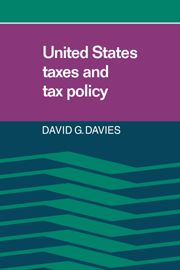Book contents
- Frontmatter
- Contents
- Preface
- 1 Economic foundations of U.S. tax policy
- 2 The individual income tax
- 3 Economic effects of individual income taxes and inflation
- 4 Expenditure versus income taxation
- 5 The taxation of capital gains
- 6 The corporation income tax
- 7 The corporation income tax and inflation
- 8 Social security payroll taxes
- 9 The value added tax
- 10 The sales tax
- 11 State taxes
- 12 Local government taxes
- 13 The distribution of tax burdens
- 14 Status of U.S. taxes and policy
- Appendix
- References
- Index
5 - The taxation of capital gains
Published online by Cambridge University Press: 05 May 2010
- Frontmatter
- Contents
- Preface
- 1 Economic foundations of U.S. tax policy
- 2 The individual income tax
- 3 Economic effects of individual income taxes and inflation
- 4 Expenditure versus income taxation
- 5 The taxation of capital gains
- 6 The corporation income tax
- 7 The corporation income tax and inflation
- 8 Social security payroll taxes
- 9 The value added tax
- 10 The sales tax
- 11 State taxes
- 12 Local government taxes
- 13 The distribution of tax burdens
- 14 Status of U.S. taxes and policy
- Appendix
- References
- Index
Summary
Nature of capital gains
According to United States tax law, capital is defined as any property except that held for sale in the ordinary course of business. Inventories, depreciable business property, real property used in a trade or business, and debt obligations sold or exchanged by financial institutions are not normally subject to the capital gains tax, but they may be subject to income and property taxes.
Capital gains taxation is concerned mainly with individuals but also with certain types of businesses that own property. When the nominal value of property rises above the price paid its owner, there is a capital gain; the increase in value of the asset is subject to capital gains taxation when the asset is sold. For example, the owner of a house purchased in 1975 for $50,000 and sold in 1986 for $115,000 realized a $65,000 capital gain, which in most cases is subject to taxation.
A more precise determination of a capital gain (or loss) involves the difference between the amount realized, which is the gross amount received for the sale of property less commissions and other selling expenses, and what the Treasury calls the adjusted basis. The latter normally includes the original cost of property augmented by improvements but adjusted downward for depreciation.
- Type
- Chapter
- Information
- United States Taxes and Tax Policy , pp. 91 - 118Publisher: Cambridge University PressPrint publication year: 1986
- 1
- Cited by



